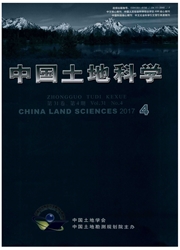

 中文摘要:
中文摘要:
研究目的:分析北京市土地利用中不同群体认知关键词及其逻辑结构关系,并挖掘网络涌现出的土地利用群体智能。研究方法:利益相关者理论,链接结构分析方法中HITS算法。研究结果:关于北京市的研究表明(,1)专家群体的权威关键词是土地退化,中心关键词是遥感监测;(2)政府群体的权威关键词是土地利用管理,中心关键词是土地用途管制;(3)公众群体的权威关键词是集约高效用地,中心关键词是城市空间规划。研究结论:一方面各个群体通过发表各自关于土地利用问题的见解和观点产生相互影响,从而涌现出群体智能;另一方面各个群体对土地利用问题的认知存在着不一致性,而这种不一致性推动了不同群体更深层次的互动,这也是产生网络群体智能涌现的驱动力。建议政府更加重视公众参与,并有效地利用互联网引导公众舆论导向。
 英文摘要:
英文摘要:
The purpose of this paper is to analyze the keywords and logical structure relationship of different interests groups on land uses in Beijing and discover the web-based swarm intelligence on land use. Method of stakeholder theory and HITS algorithm in the link-structure analysis were employed. The results showed that 1)regarding the expert groups, land degradation was the so-called authority keyword and remote monitoring was the so-called hub keyword. 2)In the government groups, land use management was the authority keyword and land use control was the hub keyword. 3)In the public groups, Intensive and efficient land use was the authority keyword and urban spatial planning was the hub keyword. The conclusions indicate that on one hand, the mutual influences among different groups are generated by views expression on land use problems, which results in the emergence of swarm intelligence;on the other hand, the cognition of each group on land use issues is not consistent. And the inconsistency could promote deeper interaction of different groups, which is the driving force of web-based swarm intelligence. In addition, the government should pay attention to public participation and effectively use the Internet to guide public opinions.
 同期刊论文项目
同期刊论文项目
 同项目期刊论文
同项目期刊论文
 期刊信息
期刊信息
